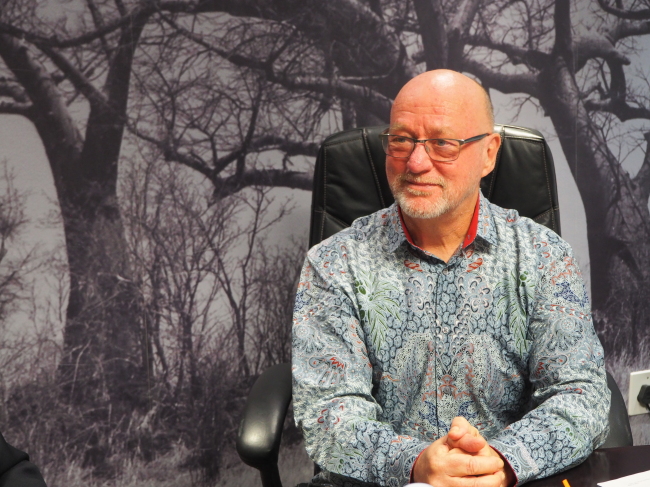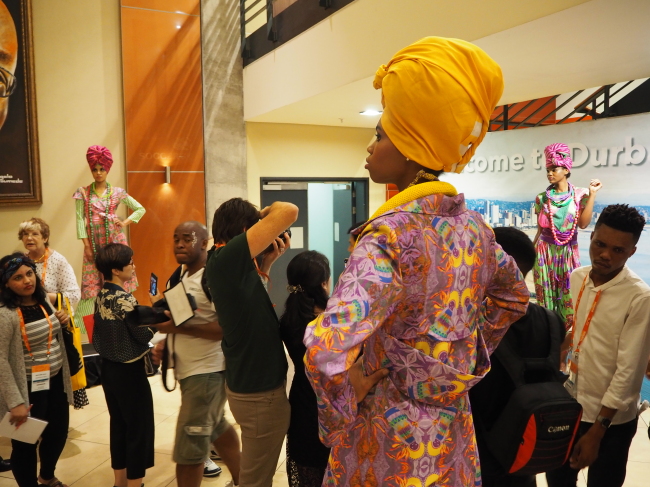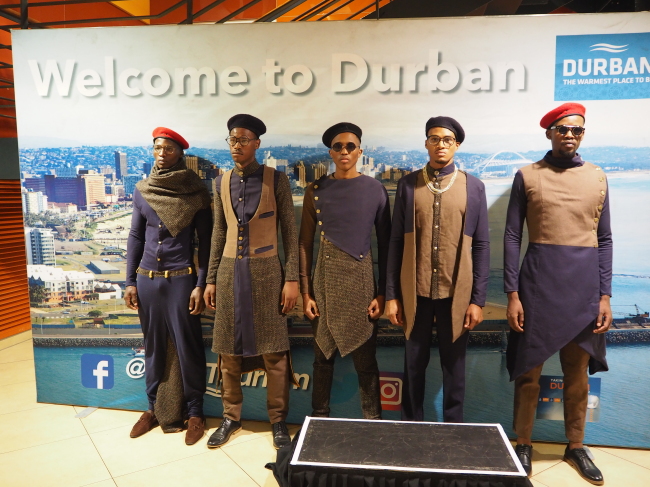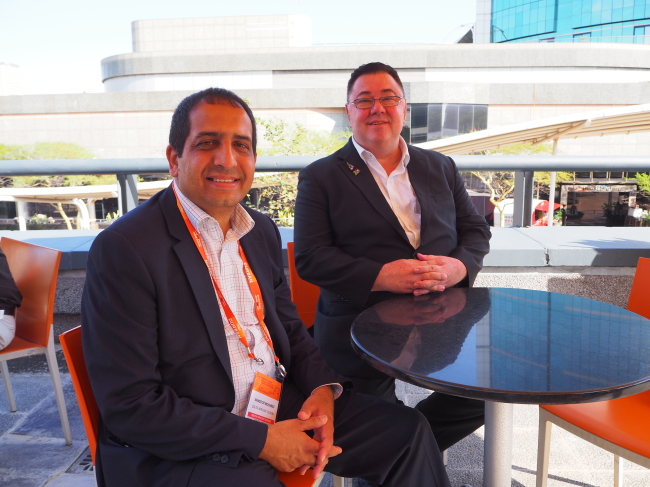 |
South African Tourism Minister Derek Hanekom (right) and Deputy Minister Elizabeth Thabethe ring the bell signaling the start of the 2018 African Travel Indaba on May 8 at the Durban International Convention Center. (Joel Lee/The Korea Herald) |
DURBAN, South Africa -- Holding his deputy minister’s hands, South African Tourism Minister Derek Hanekom boisterously rang the bell that signaled the launch of the 2018 African Travel Indaba in Durban in early May.
The continent’s largest tourism trade show took place from May 8-10 at the Durban International Convention Center, bringing together over 7,000 delegates from 80 countries who took part in networking, buying and selling of Africa’s world-class tourism products and services.
The annual event attracted nearly 1,750 buyers and 1,120 exhibitors who showcased their products, with over 20,000 business meetings held over the three days.
One-hundred thirty-five small enterprises from South Africa’s nine provinces, known as the “hidden gems,” participated as entrants.
Tourism is one of the largest and fastest-growing national industries of South Africa. It currently employs nearly 700,000 people and took up 3 percent of the country’s gross domestic product in 2016, according to the latest annual Tourism Satellite Account for South Africa report.
 |
South African Tourism Minister Derek Hanekom speaks to The Korea Herald at the 2018 African Travel Indaba on May 8 at the Durban International Convention Center. (Joel Lee/The Korea Herald) |
“We will enhance support for destination marketing in key tourism markets and take further measures to reduce regulatory barriers and develop emerging tourism businesses,” South African President Cyril Ramaphosa said in his first state of the nation address in February.
This year’s promotion coincides with the centenary birth anniversary of the late Nelson Mandela, South Africa’s first democratically elected president and the nation’s ever-present hero and icon.
Mandela is visible all across South Africa in 2018. South Africa’s Department of Tourism has selected 100 experiences, attractions and destinations in memory of Madiba -- a title of respect for Mandela, derived from his Xhosa clan name -- for travelers to visit this year. Tourists can download the Mandela Journey Application onto their mobile phones and online devices.
“We are a society that is changing as we speak. There are still moments of racial tension, but in general, given our history of racial and social polarization, we have come a long way,” Hanekom told The Korea Herald in an interview at the Indaba.
 |
KwaZulu-Natal Provincial Minister for Economic Development, Tourism and Environmental Affairs, Sihle Zikalala, speaks in front of participants at the breakfast meeting for Indaba delegates at Hilton Hotel in Durban on May 8. (Joel Lee/The Korea Herald) |
He added that the government has striven to give opportunities to those denied economic chances under the apartheid system, which ended in 1994 with the nation’s first democratic elections. Tourism is one of the key sectors through which the economically marginalized can participate in the market economy, he pointed out.
“The African National Congress had a vision of a nonracial, nonsexist society. It’s a long-term vision but we are working systematically toward it,” he said. “We have to do more to ensure that we transform the economy and give opportunities to those who were denied opportunities before.”
The government launched a tourism transformation fund in May to assist new black entrants into the tourism sector, drawing from a combination of their savings, loans from lending institutions and government grants.
Noting that tourism is relatively an easy sector for newcomers to enter into, the bureaucrat said the administration is “intervening in various ways so that its face changes as well.”
“And it is changing,” Hanekom stressed. “We are now a country where people live in harmony with each other, we are a vibrant multicultural society different races, religions and cultural backgrounds. Generally, there is a high level of tolerance in South Africa.”
 |
Models pose at the welcome event for Indaba delegates at the Moses Mabhida Stadium on May 7. (Joel Lee/The Korea Herald) |
 |
Models pose at the welcome event for Indaba delegates at the Moses Mabhida Stadium on May 7. (Joel Lee/The Korea Herald) |
South African tourism experts shared the view, underscoring the importance of integrating and incorporating young people into the rapidly emerging tourism and hospitality sectors. Raising youth employment in South Africa, where unemployment levels remain high, remains a top government priority.
According to the World Tourism Organization, the number of international tourists reached over 1.3 billion people last year, with Africa receiving 62 million visitors, or 5 percent of the global share. African countries are “taking tourism seriously,” it noted, based on tourism’s contribution to the continent’s total gross domestic product at 8 percent last year, generating $177 billion dollars.
Tourism is a key driver of job creation, with an estimated 6.5 percent of all continental employment generated in the sector. South Africa, in particular, aims to attract 15 million visitors by 2020 and add 225,000 new jobs in tourism.
“Very few destinations in the world can offer the variety that South Africa can offer,” South African Tourism President for Asia-Pacific inbound, Bradley Brouwer, said in an interview. He mentioned tours featuring ecological and natural destinations, historical sites showcasing legacies of the apartheid and national democratic transition, safaris, honeymoon destinations and packages, townships, music and jazz as well as food and wineries.
 |
South African Tourism President for Asia-Pacific inbound, Bradley Brouwer (right), and President for Asia-Pacific outbound, Mansoor Mohamed, speak to The Korea Herald at the 2018 African Travel Indaba at Durban International Convention Center. (Joel Lee/The Korea Herald) |
“We got nine provinces offering a great variety of destinations and unique experiences. South Africa has been nominated twice by the United Nations World Tourism Organization as the most repeatedly visited destination in the world.”
Conceding the distance between East Asia and South Africa is far, Brouwer argued that “even though it takes a little longer in travel, it’s definitely worth it to visit South Africa.”
Mansoor Mohamed, the president for Asia-Pacific outbound, said that tourism presents great opportunities for small businesses that were previously excluded from participating in the economy.
“For the last 20 or more years South Africa has done a lot to include small and medium-sized enterprises in our tourism and economy,” he said.
“The legacy of apartheid cannot be eradicated in one day. It will last another generation or two, so we want to spread out the message that our tourism is not just about bringing in large numbers of tourists, but spreading the good will across our national community, and helping eradicate the apartheid legacy.”
He added, “We hope that international tourists don’t just come here to enjoy the great sceneries, cultures, food and wine, but they appreciate the process of ecotourism, tourism’s impact on the local communities, and historical tours that shed light on the apartheid era. It’s a responsible thing to do.”
By Joel Lee (
joel@heraldcorp.com)













![[Today’s K-pop] Blackpink’s Jennie, Lisa invited to Coachella as solo acts](http://res.heraldm.com/phpwas/restmb_idxmake.php?idx=644&simg=/content/image/2024/11/21/20241121050099_0.jpg)